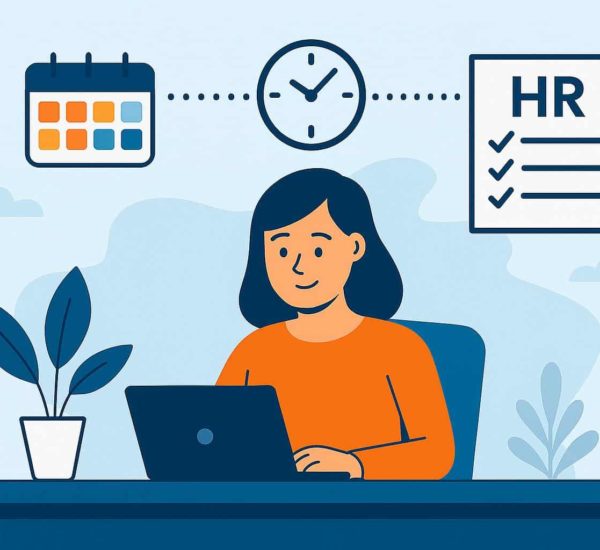Love is everywhere, even in the cubicle next to you—especially if you believe recent stats. According to Forbes, nearly half of people surveyed tied the knot with a coworker, making office romances twice as likely as those born from swiping left or right. Who needs dating apps when you’ve got water cooler chats?
Blame it on the 9 to 5 grind, but it turns out we’re spending more time eyeing our colleagues than swiping through potential matches. Forbes also found that over 60% of respondents cited lack of time outside work as the main reason for office flings. And let’s face it, with 81% of workers admitting to a workplace romance at some point, the odds of Cupid visiting your office are pretty high.
Even with more lenient HR policies, workplace romances still feel a bit taboo. Employees might wonder if mixing business with pleasure is a good idea, but asking HR feels like stepping into a confessional booth. The dating game at work? It’s a mystery wrapped in a cubicle, with HR policies as enigmatic as an ancient love spell.
Is Dating Coworkers a Bad Idea? HR Specialists Say Yes
Sure, some may argue that dating a coworker is like mixing coffee and keyboards—a recipe for disaster. But who are we kidding? Cupid’s arrow has a way of striking even the most professional of hearts. So, instead of burying our heads in the HR manual and hoping for the best, let’s embrace the inevitable and tackle it head-on.
That’s where policies come into play. Think of them as the guardrails on the road to romance—keeping things on track while allowing a bit of room for spontaneity. Sure, we can’t predict every love connection that blooms in the break room, but having a solid policy in place helps us navigate the twists and turns with confidence.
So, whether it’s a clandestine rendezvous in the supply closet or a full-blown office romance, HR is here to help you navigate the murky waters of workplace relationships. After all, love may be blind, but it doesn’t have to be a liability!
Why You Need a Workplace Relationships Policy
When it comes to office romances, it’s like walking a tightrope between love and disaster. Sure, some end up in happily-ever-afters, but for every successful match, there’s a cautionary tale lurking in the break room shadows. And trust me, HR has seen it all—from productivity plunges to power-play dramas and everything in between.
But fear not, the office romance policy is here to save the day! It’s like the superhero cape that protects your company from heartaches and headaches alike. With clear guidelines in place, everyone knows where they stand when it comes to office romance. No more awkward whispers or wondering if that flirty water cooler chat crossed the line. So, is dating a coworker a recipe for disaster? Well, with the right policy in place, it might just be the start of a workplace love story.
Drafting an Employee Dating Policy
Drafting the perfect employee dating policies is like composing a symphony—you need all the right notes to create harmony in the office. And trust us, with lovebirds fluttering around the water cooler, you’ll want to make sure you’ve got a solid tune to dance to.
First off, let’s talk about disclosure. It’s like the RSVP to the office romance party—everyone needs to let HR know if they’re bringing a plus one. Why? Well, we want to avoid any awkward power imbalances or conflicts of interest. Plus, it gives us a chance to make sure everyone’s in the right department to avoid any ‘Beauty and the Beast’ situations.
Next up, consensual relationships. We’re all about love at first sight, but it’s gotta be mutual. So, let’s make it clear: no pressure, no harassment, and definitely no unwanted advances. If sparks are flying, great! If not, let’s keep it strictly professional.
Now, onto the conduct. We’re all for a bit of workplace banter, but let’s keep the romance for after hours, shall we? Public displays of affection might make things a tad uncomfortable for your colleagues—and let’s not even get started on conflicts of interest. Keep it cool, keep it classy.
Confidentiality is key. What happens in the office stays in the office, folks. No gossiping about who’s seeing who—it’s nobody’s business but their own. Plus, spreading rumors can create a seriously toxic work environment, and we’re all about that #GoodVibesOnly life.
Last but not least, consequences. Think of it as the final chord in our workplace dating symphony. Violate the policy, and you might find yourself singing a different tune—disciplinary action, reassignment, or even termination. So, let’s all play by the rules and keep the love flowing without any workplace drama, shall we?

Red Flags to Look For Dating Etiquette in the Workplace
Identifying signs of inappropriate workplace relationships is crucial for maintaining a professional and respectful environment. While workplace romances can add a layer of complexity to the dynamics, it’s essential to recognize when things may be crossing a line.
Research indicates that workplace romances can contribute to a 17% increase in break-up anxiety, indicating the potential emotional toll they can take. Moreover, concerning statistics reveal that 40% of individuals engaged in office romances were simultaneously involved in committed relationships, highlighting the ethical challenges such relationships may pose.
To address these issues, HR policies serve as a guiding compass, offering employees clear directives on navigating workplace relationships with integrity and professionalism. Particularly for new employees, understanding the boundaries outlined in company policies can prevent misunderstandings and promote a culture of respect and accountability.
For HR professionals, remaining vigilant for signs of inappropriate behavior is paramount. This includes observing public displays of affection, recognizing non-consensual flirtation, and addressing any reports of favoritism or animosity stemming from romantic entanglements. Additionally, monitoring changes in employee behavior, such as sudden absenteeism or declines in performance, can provide insight into potential workplace relationship issues that require attention.
Office Dating: Dos and Don’ts
Let’s take a look at the workplace dating guidelines:
Consider the Consequences
Before diving into a workplace romance, it’s vital to weigh the potential risks. There’s always the possibility that the relationship might not work out, leading to awkwardness and hurt feelings. Conflicts of interest can also arise, as juggling dual roles (colleague and partner) can complicate professional decisions.
For example, if you’re dating a teammate, do you prioritize the team’s needs or your partner’s? Additionally, your professionalism could be questioned. Colleagues might think you’re giving or receiving preferential treatment, especially if there’s a power dynamic at play. Relationships with higher-ups can create perceptions of favoritism, casting doubt on your professional achievements.
Hope For Good
If you decide to proceed despite these risks, your intentions are crucial. Your coworkers’ perceptions of your motives will shape their reactions. If they believe you’re pursuing the relationship for personal gain or excitement, they’ll view you less favorably. However, if they see that you genuinely care about each other, they’re more likely to be supportive. So, before jumping in, assess your motives and how they might be perceived. Starting with positive intentions can also help minimize hurt feelings and misunderstandings if the relationship doesn’t last.
Know Your Company’s Policies
Before diving into a workplace romance, make sure you understand your company’s rules about dating coworkers, vendors, customers, or suppliers. Many organizations have strict policies and often require you to disclose any such relationships. Ignoring these rules can land you in hot water. If you’re already in a relationship that breaks company policy, it’s best to come clean early—waiting will only make things worse.
Some companies are relaxing these rules, realizing they’re hard to enforce and don’t really stop workplace romances. Especially after movements like #MeToo, many workplaces now focus on setting boundaries and maintaining professionalism. For example, at organizations like Facebook and Google, you can only ask a coworker out once. If they say no or give a vague response, you can’t ask again.
Steer Clear of Dating Your Boss or Subordinates
No matter how much you click, dating someone in your direct chain of command is usually a bad idea. Relationships between managers and their subordinates can create big conflicts of interest and raise questions about favoritism. It’s tough to be objective when you’re dating the person you’re reviewing, and perceived bias can hurt team morale. Even if boss-employee relationships sometimes work out, it’s smart to address any potential conflicts immediately. This could mean transferring to a new team or reassigning the direct report to someone else to keep things professional and above board.
Be Open About It
When you start dating a coworker, transparency is key. It’s best to let your colleagues and manager know about the relationship. This might feel awkward at first, especially if the relationship is new, but it helps prevent misunderstandings and reduces workplace gossip. Keeping things a secret can erode trust and make the situation more complicated. A simple and straightforward announcement works best—something like, “We’ve gone on a few dates, but we prefer to keep the details private.”
Make sure your manager is informed early on. This allows them to make necessary staffing adjustments if needed, ensuring there are no conflicts of interest. Deciding whether to inform HR depends on your company’s policies and the level of trust you have in the department. Some companies require disclosure, while others may not. LGBTQ employees might face additional concerns, so it’s important to consider how comfortable you feel sharing your relationship status in your specific work environment.
Establish Boundaries
While being open about your relationship is important, maintaining professionalism is equally crucial. Avoid public displays of affection and keep flirtatious behavior outside of work hours. This ensures a comfortable work environment for everyone and prevents colleagues from feeling uneasy.
Discuss boundaries with your partner to navigate work-related issues and ensure your relationship doesn’t interfere with your professional duties. This might not sound romantic, but having clear rules about when and how to discuss work matters can help keep both your personal and professional lives in balance.
Handling a Breakup
Not all workplace romances last, and if you find yourself ending a relationship with a coworker, it’s best to approach it with professionalism. Be honest about the breakup with your colleagues to avoid rumors and speculation. Try to remain civil and respectful towards your ex-partner at work. If working together becomes too uncomfortable, you might need to consider transferring to another department or even seeking a new job.
Ultimately, minimizing drama is crucial. The smoother and more respectful the breakup, the better it is for everyone involved, including your professional reputation and workplace harmony.
In summary, while love can be complicated, being informed makes all the difference. Educating your employees on the proper protocols for workplace romances ensures their well-being and safeguards your company.




